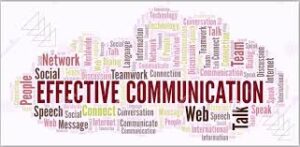Mastering Effective Managerial Communication: A Guide to Organizational Success

Introduction:
Effective communication lies at the heart of organizational success. In this comprehensive guide, we delve into the intricacies of managerial communication, exploring its significance in the workplace and providing actionable insights to build a culture of effective communication. From understanding diverse communication types to mastering active listening skills, this article equips you with the tools necessary for fostering a thriving and successful organization.

Section 1: The Significance of Effective Communication in Management
Communication breakdowns can cripple workplace dynamics. We explore how effective communication enhances shared understanding, aligns objectives, and prevents costly mistakes and conflicts. Managers skilled in communication inspire teamwork, boost employee satisfaction, and drive innovation, making effective managerial communication not just a choice, but a necessity in today’s fast-paced business world.
Section 2: Understanding the Multifaceted Nature of Communication
Communication isn’t limited to words; it encompasses verbal, nonverbal, written, and visual forms. Managers need to master each type, using clear language, appropriate nonverbal cues, and tailored communication styles. From emails and reports to facial expressions and tone of voice, understanding diverse communication channels ensures messages are received clearly and accurately.
Section 3: The Four Components of Effective Communication

Effective communication is a blend of clarity, relevance, timeliness, and consistency. Clarity ensures articulation of thoughts in understandable terms, while relevance tailors the message to the audience’s needs. Timeliness captures attention, and consistency aligns verbal and nonverbal cues, enhancing the message’s impact. Mastering these components ensures your communication resonates with your audience effectively.
Section 4: The Role of Active Listening in Communication
Active listening is a linchpin in communication. It goes beyond hearing words, involving understanding context, asking relevant questions, and providing thoughtful feedback. Managers who master active listening foster collaboration, enhance productivity, and create a positive work environment. By being fully present and receptive, managers can strengthen relationships with employees, colleagues, and stakeholders.
Section 5: Communicating Effectively with Various Stakeholders
Effective managerial communication extends to employees, colleagues, and stakeholders. Managers must set clear expectations, encourage open dialogue, and establish mutual respect among employees. With colleagues, building rapport and understanding diverse work styles fuel creativity. However, communicating with stakeholders is pivotal. By transparently sharing organizational goals, progress, and risks, managers can enhance the organization’s reputation, leading to financial success.
Conclusion:
In conclusion, mastering effective managerial communication is pivotal for organizational success. By embracing diverse communication forms, understanding the components of effective communication, and honing active listening skills, managers can create a culture of openness and collaboration. Fostering strong relationships with employees, colleagues, and stakeholders strengthens the organization’s foundation, ensuring a prosperous and thriving future. Effective communication isn’t just a skill; it’s the backbone of a successful organization.









